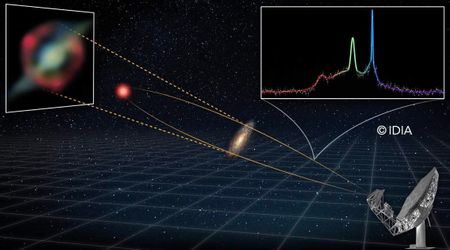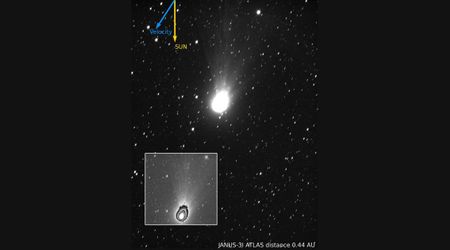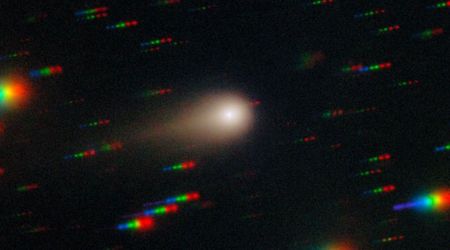Rocket Lab successfully launches BlackSky's Gen-3 satellite from New Zealand

Rocket Lab has just had another successful launch, this time supporting BlackSky's Gen-3 satellite constellation. The mission, named "Full Stream Ahead," lifted off from Pad A at Rocket Lab's New Zealand launch complex in Mahia. The targeted launch time was 11:57 am New Zealand Time on June 3 (7:57 pm Eastern Time Zone, 2357 Coordinated Universal Time on June 2). This mission deployed BlackSky's newest Gen-3 satellite into low Earth orbit at an altitude of 292 miles. On June 3, the 59-foot-tall (18-meter) Electron rocket completed its seventh launch of 2025, marking its 65th flight overall. The Electron specializes in providing small satellites with dedicated rides to orbit, as per Space.com.

This launch followed the successful deployment of BlackSky's first Gen-3 satellite earlier this year. That satellite was also launched aboard an Electron rocket on February 18, 2025, as part of the "Fasten Your Space Belts" mission. BlackSky reported impressive results, delivering its initial very high-resolution images just five days after launch and activating its analytical capabilities within three weeks. Brian O'Toole, the CEO of BlackSky, highlighted this rapid progress in a May 6 statement, noting, "BlackSky has demonstrated incredible, industry-leading speed for launch to on-orbit operations, completing commissioning for our first Gen-3 satellite a full month ahead of schedule," per Spaceflight Now.
It’s launch day for the “Full Stream Ahead” mission.
— BlackSky (@BlackSky_Inc) June 2, 2025
Watch $BKSY’s second Gen-3 #satellite fly to orbit via @RocketLab today at 7:57 p.m. EDT (11:57 a.m. NZT).
Live feed: https://t.co/fDiY6L0r1k#spacebasedintelligence #geospatialintelligence #GEOINT pic.twitter.com/WKaCzlaw8S
He further emphasized that this swift performance underscores the team's expertise and the robust design, production, and testing of their systems, giving BlackSky a significant advantage in scaling its service. O'Toole concluded by stating, "The regular cadence of Gen-3 launches will produce a robust combination of capacity and low-latency, high-revisit capabilities to support near-term, early access customers and long-term demand for real-time space-based dynamic monitoring services."
And just like that…another flawless Electron launch in the books💅
— Rocket Lab (@RocketLab) June 3, 2025
Congrats to our friends at @BlackSky_Inc on deploying another stunning Gen-3 satellite. We’re thrilled to help grow your constellation. pic.twitter.com/TXJj1iNUA9
This particular launch marked the second of four Electron flights BlackSky has booked with Rocket Lab for 2025. In total, this was the tenth time Rocket Lab has launched satellites for BlackSky. While Rocket Lab is a primary launch partner, Blacksky has also utilized SpaceX's Falcon 9 rocket in the past, sending four of its previous satellites into orbit as rideshare payloads alongside Starlink batches in August 2020 and December 2021.
Payload deployment confirmed. Welcome to space (again), @BlackSky_Inc pic.twitter.com/yVVGSexOia
— Rocket Lab (@RocketLab) June 3, 2025
The Gen-3 satellites are designed for a lifespan of five years or more. They communicate using the X-band for primary data downlink and the S-band for uplink. A key feature of these satellites is their efficiency: they are capable of completing an imaging task and collecting the requested images in under 10 hours, depending on customer requirements. Once collected, these high-resolution images can then be delivered to BlackSky's customers in a remarkably short timeframe, typically less than 90 minutes.
Blacksky maintains strong ties with federal government agencies, including the National Reconnaissance Office, the National Geospatial-Intelligence Agency, the Department of the Air Force, and NASA, among its customers. These relationships underscore the critical role BlackSky's services play in national security and scientific endeavors. A notable engagement for BlackSky is an Air Force Research Laboratory (AFRL) contract, potentially valued at approximately $23.7 million, for a program called "Global Moving Target Engagement." This contract, initiated on March 5, 2024, with an initial allocation of about $3.5 million, is slated for completion by June 15, 2028.









